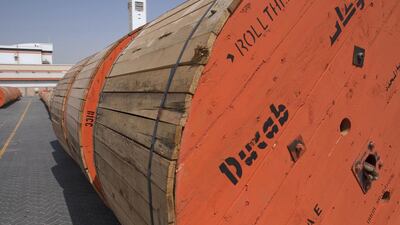Ducab has won a breakthrough contract to supply cabling for two South Korean nuclear plants.
The cable maker – jointly owned by Investment Corporation of Dubai and Senaat (General Holding Corporation, Abu Dhabi) – said yesterday that it will supply the bulk of cabling for the two Shin Hanul nuclear reactors being built for operator Korean Hydro-Nuclear Power (KHNP) in South Korea.
The contract is the first international nuclear business for Ducab. It was able to penetrate the traditionally closed South Korean market partly because of a major scandal two years ago, when a South Korean company supplying KHNP was found to have provided fraudulent certification.
Ducab also had the advantage of being the power cable supplier for the four APR1400 reactors at the Barakah site – the same design as Shin Hanul – being built by the Korea Electric Power Corporation/KHNP team in Abu Dhabi’s Western Region.
South Korea hopes to market its APR1400 design internationally, especially in the Middle East, where several countries have set out ambitious nuclear power goals.
The UAE’s programme, the first nuclear power project in the Gulf Arab states, is essential to those efforts.
Ducab will be supplying the “balance of plant” cabling, which accounts for most of the power cabling required by reactors outside the containment vesselitself, said Andrew Shaw, Ducab’s managing director. It is a “multimillion-dollar” contract, although KHNP did not want to disclose the exact value.
“A big part of us winning it was successfully supplying Kepco and KHNP here in the UAE,” said Mr Shaw.
“We have supplied a truckload of cabling but almost an equivalent truckload of paperwork and certification was required.”
Ducab has had to pass rigorous testing by, for example, the Institute of Electrical and Electronics Engineers in North America and others to determine whether it could withstand nuclear plant conditions over the 60-year projected life of the plants.
“Considering the sensitive and critical needs of a nuclear power facility, we conducted a proper audit,” said Seok Cho, the chief executive of KHNP. “Providing nuclear-grade materials is the highest form of quality mark and this is a major achievement.”
The first of the APR1400 design reactors ran into trouble at the end of 2013 when KHNP reported that control cabling installed by the Korean firm JS Cable had failed critical performance tests.
Earlier that year, regulators had found fraudulent certification of cabling from the same supplier across the industry, which led to nuclear plant shutdowns and power outages.
JS Cable’s parent company subsequently shut down the unit in mid-2014 to avoid further scandal, as KHNP sought alternative suppliers.
The Shin Kori 3 reactor, the first of the APR1400s scheduled to come into operation, was further delayed after a faulty valve supplied by GE led to an explosion that killed three KHNP workers in 2014.
The subsequent parts recall delayed start-up of Shin Kori 3 until January this year, about two years behind schedule, and also pushed back Shin Kori 4.
“The scandal did taint the ‘trustability’ of the local suppliers,” said Mr Shaw. “When the scandal hit, KHNP said, ‘right, we’ll open the door’. There has always been a bit of international competition but they thought the local industry let us down so now we’ll allow proper international competition.
“Nuclear business is normally so tightly held there, frankly for us in the UAE to win a major supply deal to the Korean market … for us to get on to such a national nuclear reactor cable supplier list is a pretty big deal.”
“Our nuclear cable team at Ducab worked hard to win this contract against well-established competition,” said Ahmad bin Hassan Al Shaikh, Ducab’s chairman.
“This project win by Ducab is a matter of pride for the company, as well as for the entire manufacturing and industrial sector in the UAE,” he said.
The nuclear project win will help cement plans for expansion, Ducab executives said.
The five Ducab UAE plants employ about 1,500 workers and the existing and new nuclear cable contracts will ensure the Mussaffah 2 factory in Abu Dhabi continues to run flat out, said Mr Shaw.
Ducab is also building a Dh220 million aluminium factory at Kizad, which is expected to create 120 new jobs.
Mr Shaw said that success with the KHNP contract will help Ducab become “part of the team” as and when Kepco/KHNP expands the APR1400 programme beyond Korea and the UAE.
amcauley@thenational.ae
Follow The National's Business section on Twitter

